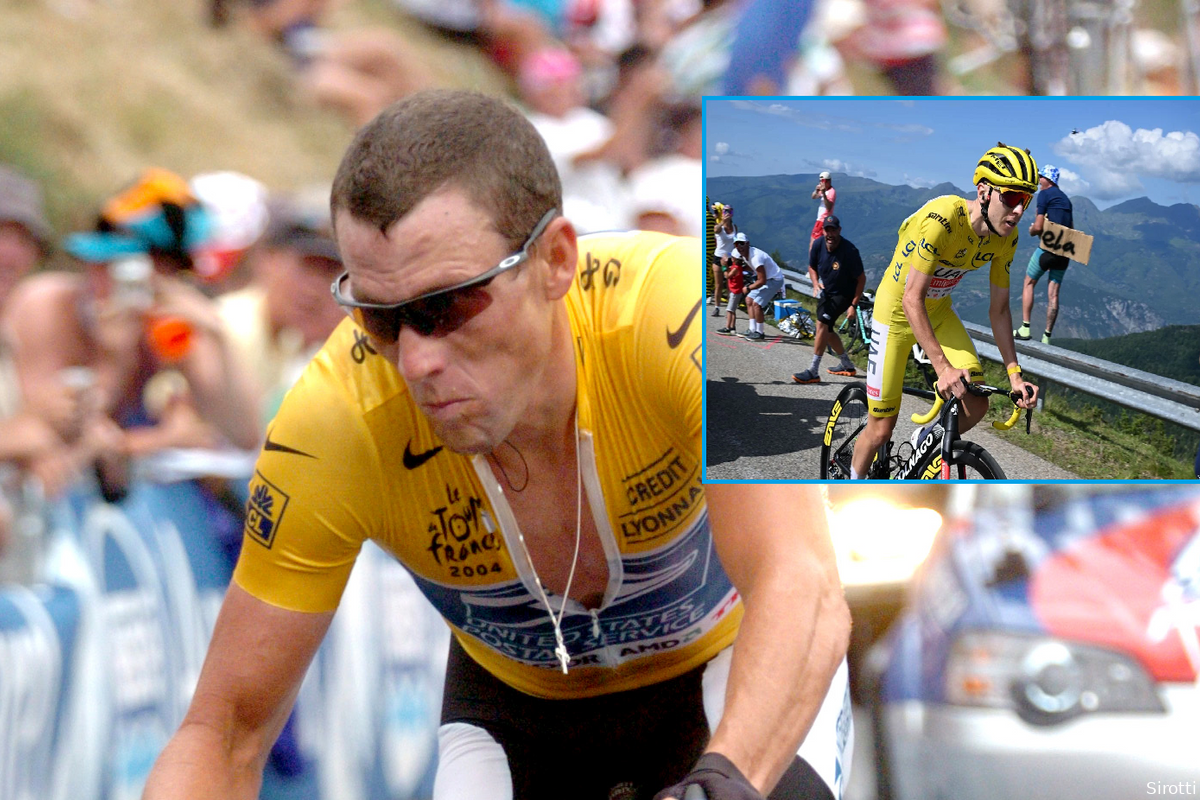
Lance Armstrong has once again stirred the pot in professional cycling, where every pedal stroke is scrutinised and every victory questioned. This time, his target is Tadej Pogacar, the Slovenian superstar currently dominating the Tour de France. Armstrong’s recent comments during his podcast *The Move* have ignited a firestorm of controversy, as he openly questioned Pogacar’s aggressive racing tactics and hinted at doping implications. “You don’t make any friends with that,” he said, suggesting that Pogacar’s relentless pursuit of victory could lead to increased scepticism about his performance.
The Context: Pogacar’s Dominance
Tadej Pogacar has been a force to be reckoned with in cycling since he burst onto the scene as a young talent. Winning the Tour de France in 2020 and 2021, he quickly established himself as one of the sport’s elite riders. His performances in this year’s Tour have been nothing short of remarkable, showcasing his climbing prowess and tactical intelligence. However, as he continues to rack up victories and break records, questions about the legitimacy of his achievements have emerged.
During the 2024 Tour de France, Pogacar has consistently demonstrated his ability to outpace competitors like Jonas Vingegaard and Remco Evenepoel. Yet, Armstrong’s scepticism regarding Pogacar’s methods has raised eyebrows and sparked debates about sportsmanship and integrity in cycling.
Armstrong’s Accusations: A Closer Look
In a segment discussing Pogacar’s recent aggressive attacks during key stages of the Tour, Armstrong did not hold back. He described Pogacar’s tactics as “unnecessary” and expressed concern that such behaviour could alienate him from fellow riders. “It’s not just about winning; it’s also about how you conduct yourself on the road,” Armstrong remarked. “You don’t make any friends with that.”
Armstrong’s comments reflect a broader narrative within cycling regarding how athletes should balance competitiveness with camaraderie. While many fans appreciate Pogacar’s tenacity, others share Armstrong’s concerns that his relentless pursuit of victory could lead to resentment among peers.
The Doping Shadow: A Lingering Concern
Armstrong’s past is marred by doping scandals that ultimately led to him being stripped of his seven Tour de France titles. His experiences have made him acutely aware of how public perception can shape an athlete’s legacy. When he questions Pogacar’s performance, it inevitably raises concerns about doping in cycling—a topic that continues to haunt the sport.
“Every time someone does something extraordinary, people start talking,” Armstrong noted. “It opens the door for speculation.” His remarks highlight a persistent issue in professional cycling: the shadow of doping allegations looms large over even the most talented athletes.
Pogacar has faced scrutiny not only for his performances but also for the nature of those performances. As he continues to dominate races, some observers are left wondering whether this level of success is sustainable without resorting to performance-enhancing drugs.
The Cycling Community Reacts
The cycling community has responded with mixed emotions to Armstrong’s comments. Many fans and analysts have voiced their frustration over what they perceive as unfounded accusations aimed at undermining Pogacar’s achievements. Cycling journalist Thijs Zonneveld tweeted, “Lance should know better than to throw around accusations without evidence. Tadej is a phenomenal talent.”
Conversely, some fans echo Armstrong’s scepticism, citing cycling’s troubled history with doping as justification for questioning extraordinary performances. “With everything that’s happened in cycling, it’s hard not to be suspicious,” another fan commented.
Tadej Pogacar’s Response
Amidst the swirling controversy surrounding his performance and Armstrong’s accusations, Tadej Pogacar remains focused on his goals for the remainder of the Tour de France. In previous interviews, he has emphasised his commitment to racing clean and competing at the highest level without resorting to performance-enhancing drugs.
“I’m just focused on my training and my racing,” he said after one stage victory. “I know what I’m capable of, and I want to prove that on the road.” His determination reflects an unwavering spirit that resonates with fans who appreciate resilience in athletes facing adversity.
Pogacar also addressed Armstrong’s comments directly during a press conference: “I don’t pay attention to what others say about me; I just focus on my bike.” This response underscores his commitment to competing fairly while navigating external pressures.
The Role of Media in Shaping Perceptions
Media coverage plays a crucial role in shaping public perceptions of athletes and their performances. Armstrong’s accusations will undoubtedly receive widespread attention and could influence how fans view Pogacar moving forward. This reality underscores the responsibility that commentators and analysts have when discussing sensitive topics like doping.
As social media amplifies voices—both supportive and critical—athletes must navigate an increasingly complex landscape filled with opinions from all corners. This environment can create additional pressure for competitors who already face immense expectations on race day.
The Future: What Lies Ahead for Cycling
The fallout from Armstrong’s accusations raises important questions about how cycling can continue to evolve while addressing lingering concerns regarding doping practices within the sport. As more young riders emerge on the scene—like Pogacar—the industry must prioritise transparency and accountability if it hopes to regain trust among fans.
Cycling organisations must ensure that robust anti-doping measures remain in place while fostering an environment where athletes feel empowered to compete cleanly without fear of stigma or suspicion.
A Legacy Under Scrutiny
Lance Armstrong’s recent comments regarding Tadej Pogacar have reignited discussions about doping in cycling—an issue that continues to cast shadows over even the most talented athletes today. While some may appreciate Armstrong’s insights based on personal experience within competitive cycling, many others view them as unfounded accusations aimed at undermining a rising star.
As Tadej Pogacar navigates this tumultuous landscape while striving for success at this year’s Tour de France, he serves as both an inspiration and a reminder that integrity matters just as much as talent within sports! With each passing stage comes fresh opportunities for growth—and perhaps even new rivalries waiting to unfold!
Leave a Reply